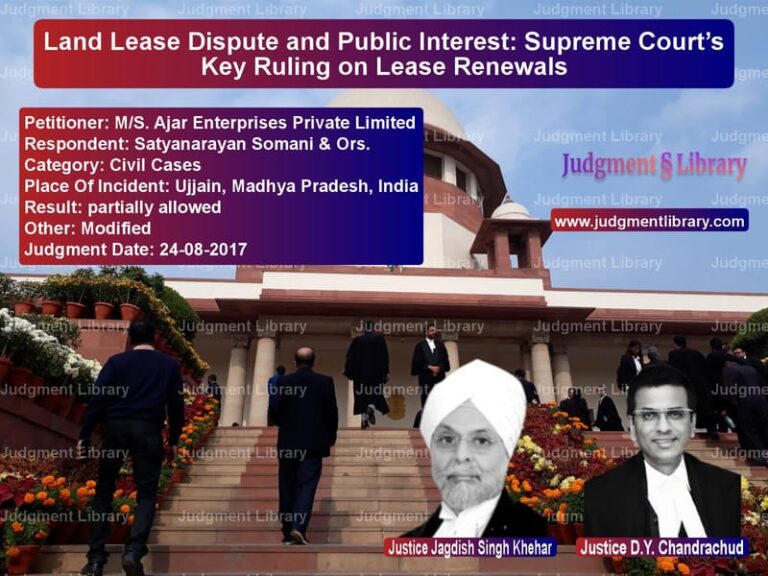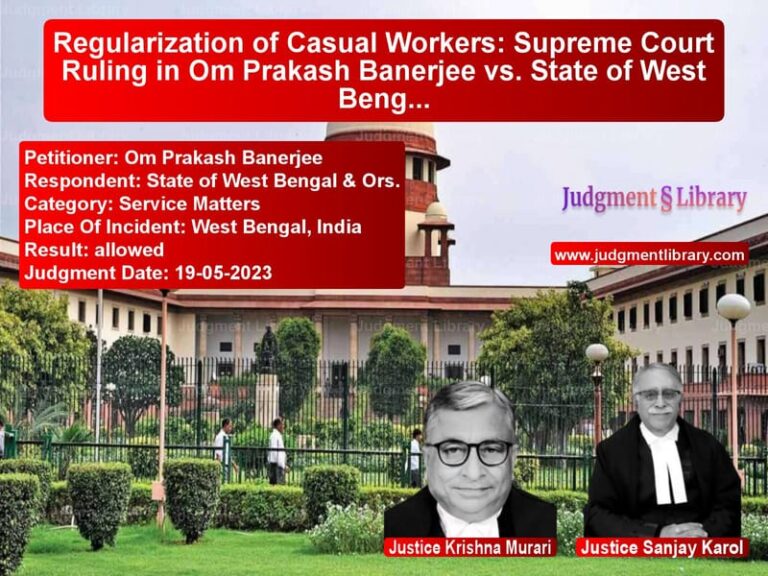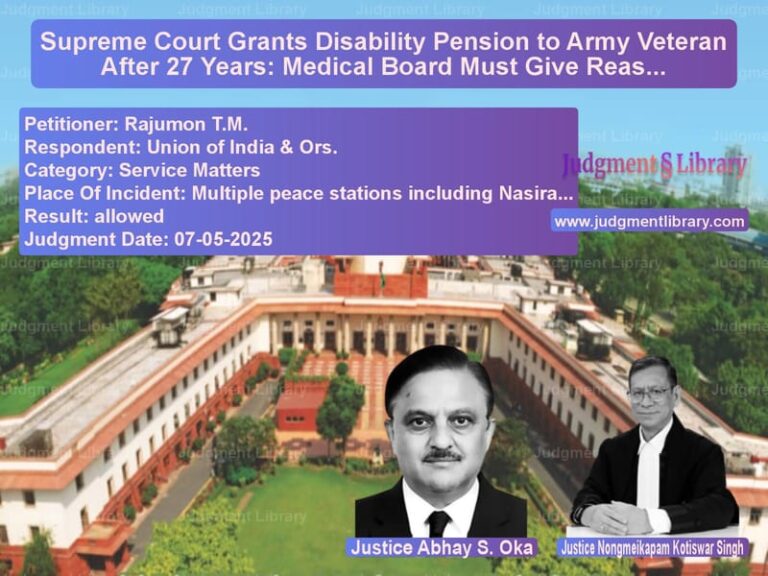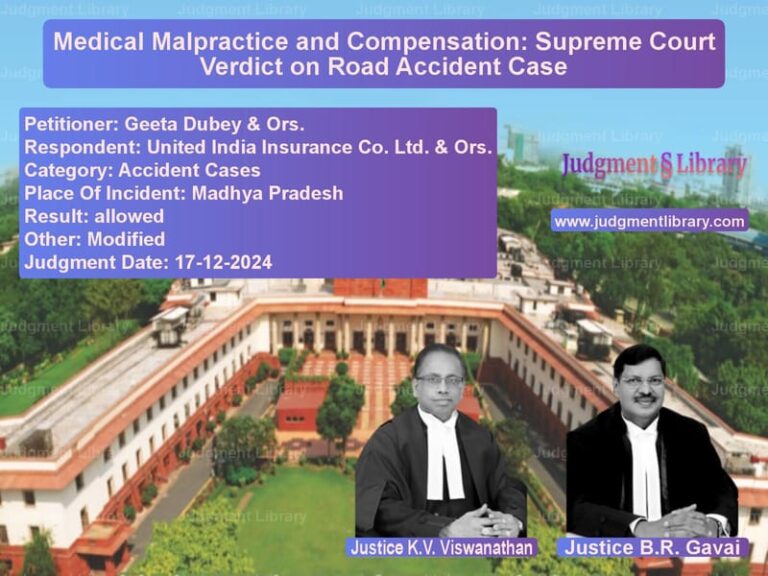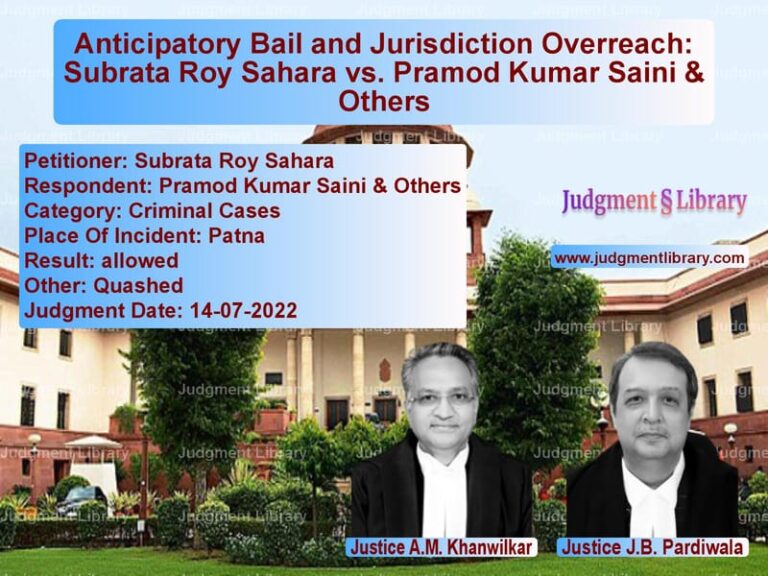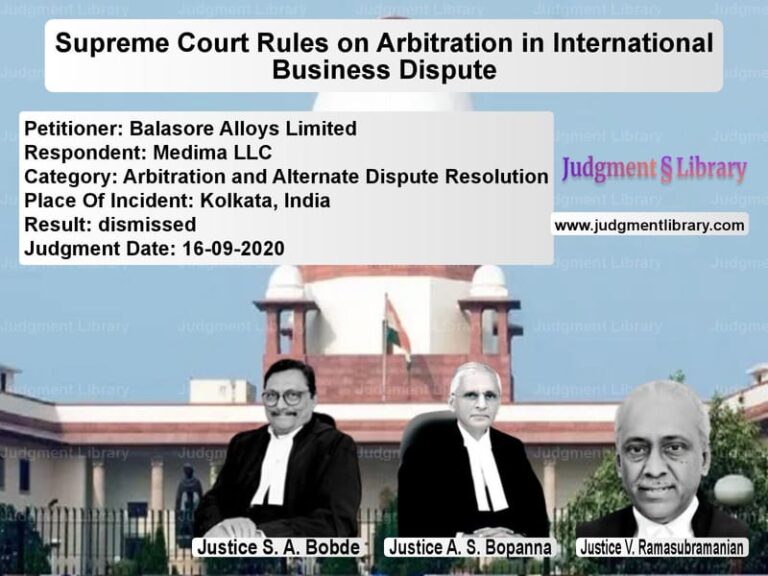Silicosis and Workers’ Rights: Supreme Court’s Landmark Judgment on Occupational Health
The Supreme Court of India, in the case of People’s Rights and Social Research Centre (PRASAR) & Ors. vs. Union of India & Ors., delivered a significant ruling on occupational health hazards, particularly addressing the rampant spread of silicosis among workers in mining, stone crushing, and other hazardous industries. This case sheds light on the constitutional rights of workers and the responsibilities of industries and government bodies in ensuring a safe working environment.
Silicosis, a fatal lung disease caused by inhaling silica dust, has been a persistent issue in India. Despite its preventability through proper safety measures, thousands of workers continue to suffer due to inadequate monitoring and enforcement of safety regulations. The Supreme Court’s decision is a landmark judgment aimed at addressing these concerns, ensuring compensation for affected workers, and implementing preventive measures.
Background of the Case
The petitioner, People’s Rights and Social Research Centre (PRASAR), a Delhi-based non-governmental organization, filed the writ petition under Article 32 of the Constitution in 2006. The petition highlighted the widespread issue of silicosis among workers in mining, stone crushing, and construction industries, emphasizing that their fundamental rights under Article 21 (Right to Life) were being grossly violated.
The petition sought:
- Recognition of silicosis as a serious occupational hazard.
- Implementation of health monitoring and safety measures.
- Compensation for affected workers and their families.
- Rehabilitation and alternative employment opportunities for victims.
Legal and Constitutional Grounds
The petition argued that the government had failed in its duty to protect workers from hazardous conditions, citing:
- Article 21: Right to a life with dignity, which includes health and safety at the workplace.
- Article 39(e): State’s duty to ensure workers are not forced into hazardous occupations due to economic necessity.
- Article 42: Protection of health and maternity relief for workers.
- Article 43: Right to a living wage and humane working conditions.
- Article 48A: Protection and improvement of the environment.
Proceedings and Reports
Over the years, the Court sought reports from various agencies, including the National Human Rights Commission (NHRC), Central Pollution Control Board (CPCB), and state governments. The findings revealed shocking lapses:
- Thousands of workers suffering from silicosis without medical aid.
- Lack of enforcement of safety regulations.
- Industries continuing hazardous practices unchecked.
- Failure to compensate victims and their families.
Several states, including Gujarat, Rajasthan, Madhya Pradesh, and Haryana, were specifically scrutinized for failing to implement protective measures.
Key Observations by the Supreme Court
The Court made several important observations:
- “The right to health is an integral part of the right to life under Article 21. The failure of industries and the state to prevent occupational diseases like silicosis violates this fundamental right.”
- “Silicosis is a preventable disease. Its continued prevalence is a result of administrative apathy and lack of enforcement of safety regulations.”
- “The affected workers and their families must be compensated without further delay. The government and industries must be held accountable for their neglect.”
- “There is an urgent need for strict monitoring of hazardous industries. Non-compliant units must be shut down immediately.”
Final Judgment and Directions
The Supreme Court issued the following key directives:
1. Environmental Compliance and Industry Regulations
The National Green Tribunal (NGT) was directed to monitor industries producing silica dust and ensure compliance with safety norms. The Court instructed state pollution control boards to:
- Conduct regular inspections of hazardous units.
- Close down non-compliant units.
- Enforce dust control and worker protection measures.
2. Compensation for Affected Workers
The Court held that workers diagnosed with silicosis, as well as families of deceased victims, must be compensated. The NHRC was tasked with ensuring the proper distribution of compensation. The Employees’ State Insurance Corporation (ESIC) was directed to:
Read also: https://judgmentlibrary.com/supreme-court-ruling-on-gm-mustard-environmental-and-legal-implications/
- Expedite compensation payouts.
- Ensure medical treatment and rehabilitation for affected workers.
3. Preventive Measures
The Court directed states to:
- Ensure proper medical check-ups and treatment for at-risk workers.
- Provide protective equipment to workers.
- Set up awareness programs on silicosis prevention.
Impact of the Judgment
This ruling is a major victory for labor rights and occupational health in India. The judgment:
- Holds the government accountable for workplace safety.
- Establishes a precedent for recognizing silicosis as a serious occupational hazard.
- Ensures compensation and medical aid for victims.
- Strengthens environmental and labor law enforcement.
With the NHRC, NGT, and ESIC actively overseeing the implementation of these directives, this judgment paves the way for improved working conditions and accountability in hazardous industries.
The Supreme Court’s decision is a crucial step toward securing the rights of workers and ensuring that industries prioritize health and safety over profits.
Petitioner Name: People’s Rights and Social Research Centre (PRASAR) & Ors..Respondent Name: Union of India & Ors..Judgment By: Justice Vikram Nath, Justice Prasanna Bhalachandra Varale.Place Of Incident: Multiple states across India.Judgment Date: 05-08-2024.
Don’t miss out on the full details! Download the complete judgment in PDF format below and gain valuable insights instantly!
Download Judgment: people’s-rights-and-vs-union-of-india-&-ors-supreme-court-of-india-judgment-dated-05-08-2024.pdf
Directly Download Judgment: Directly download this Judgment
See all petitions in Workplace Harassment
See all petitions in Disciplinary Proceedings
See all petitions in Public Sector Employees
See all petitions in Judgment by Vikram Nath
See all petitions in Judgment by Prasanna Bhalachandra Varale
See all petitions in allowed
See all petitions in settled
See all petitions in supreme court of India judgments August 2024
See all petitions in 2024 judgments
See all posts in Environmental Cases Category
See all allowed petitions in Environmental Cases Category
See all Dismissed petitions in Environmental Cases Category
See all partially allowed petitions in Environmental Cases Category


